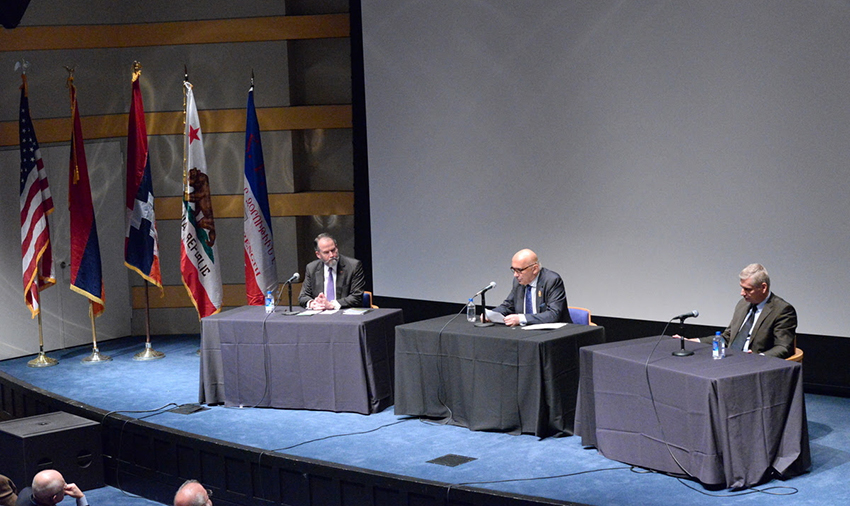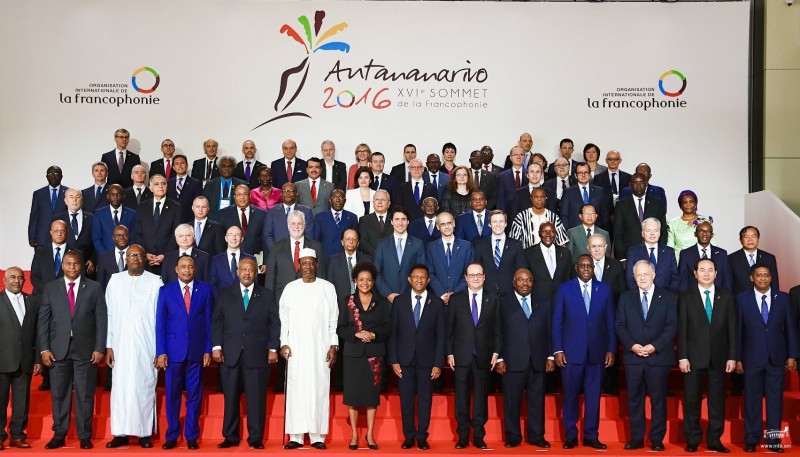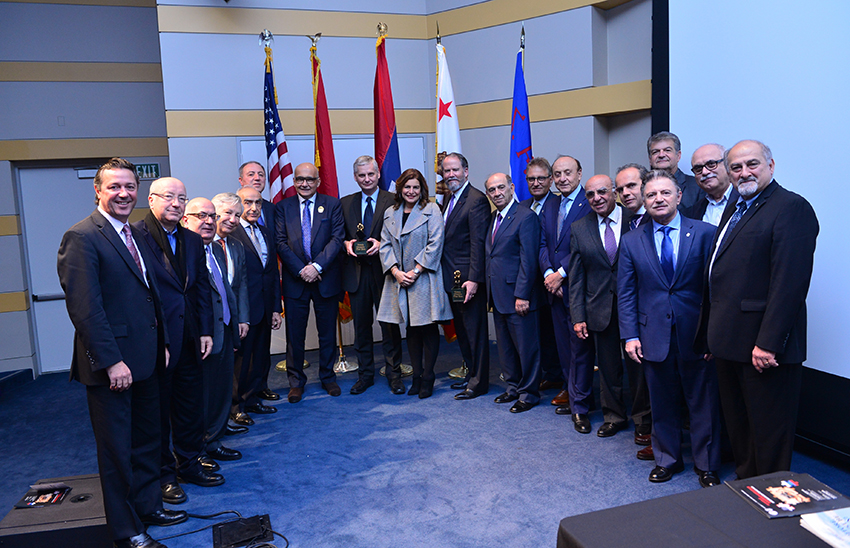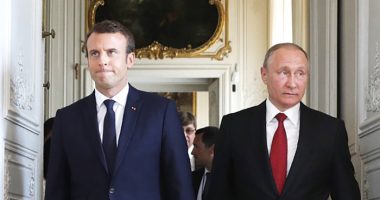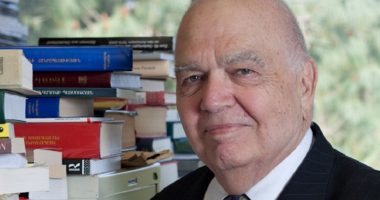LOS ANGELES — In its fifteen-year young history, the AGBU Asbeds has succeeded in engaging the Armenian-American community through a range of culturally, educationally, and socially enriching events. Perhaps the most highly regarded event is the “Evening with a Scholar” series which brings together some of the brightest minds for dialogue on relevant and timely issues of concern to all Armenians.
This year’s “Evening with a Scholar/Ambassador,” held on Friday, November 18, 2016, at Skirball Cultural Center, shed light on the current realities and future of Artsakh from the U.S. and Russian points of view, offered respectively by the Honorable John Evans, distinguished statesman and former U.S. Ambassador to Armenia, and Dr. Sergey Markedonov, Director of the Department for Problems of Ethnic Relations at the Institute for Political and Military Analysis in Moscow and Associate Professor of the Department of Regional Studies and Foreign Policy at Russian State University for the Humanities. The panel discussion was moderated by former Asbeds Chairman Mr. Kurken Berksanlar.
The program began with welcoming remarks by Asbeds Chairman Mr. Aram Aginian, who thanked the guests for their attendance, the benefactors for contributing to the success of the Asbeds mission, and the speakers for their participation. Mr. Aginian reflected on the 110th anniversary of AGBU and on the global movement it has become, promoting the Armenian culture and heritage through various programs in 28 countries. Mr. Aginian also highlighted the fifteen-year mission of the Asbeds, to create a platform where Armenians can gather to discuss current issues and participate in enriching cultural, social, and philanthropic activities. The purpose of the “Evening with a Scholar” series is the presentation of thoughts and perspectives for analysis. Following video presentations on the history of the Asbeds and Artsakh, Mr. Aginian invited Mr. Kurken Berksanslar to commence the panel discussion.
On behalf of the organizing committee, Mr. Berksanlar welcomed the guests to the event, the purpose of which was to get an understanding of reasonable expectations for the future of Artsakh, to shed light on recent developments, and to hear the viewpoint of two individuals whose perspectives have been shaped over decades through their research and first-hand experiences.
Ambassador John Evans was the first to give his analysis by offering the diplomatic/legal situation and perspective in which Artsakh is embedded. The Ambassador explained, the fact that Armenians have lived in Artsakh for centuries is incontrovertible; however, the diplomatic world does not see the history of the past centuries, rather only where things stood after the collapse of the Soviet Union. The diplomat gave an overview of the formation of the Minsk Group by the Organization for Security and Co-operation in Europe (OSCE) shortly after the ceasefire in 1994, with the purpose of finding a peaceful solution to the conflict. In the end, three Co-Chairs emerged, U.S., Russia, and France, who received a mandate not to impose a solution or agreement, but merely to serve as mediators. Thus, the primary purpose has been to stop the violence in the short term rather than a long term resolution on the future or status of Artsakh. The Ambassador also cited the importance of the Madrid Principles in the conflict, because all of the ten principles are relevant to Artsakh. The problem is that there are some apparent contradictions in the principles; thus, each side emphasizes the principles more favorable to its cause.
The Ambassador noted that up until the present, it has been the Armenia government negotiating with Azerbaijan. Having visited Artsakh over the summer, the Ambassador stated that he witnessed some divisions emerging. The people of Artsakh have slightly different interests than the government of Armenia; the time has come for Artsakh to be at the negotiations table, especially in the aftermath of the April war, declared the Ambassador. As to the future of Artsakh, Ambassador Evans stated that lots of things have to be done all at the same time for a solution to be reached. There is no easy solution he said, but the fact that there is a diplomatic track, however flawed, is encouraging. For now, strengthening the economy and defense forces is very important, as is continuing the negotiation process. Although it is slow-moving and frustrating, the alternative is continued violence and war, and the region does not need or want that, he concluded.
Professor Sergey Markedonov presented the Russian approach to regional relations and conflicts following the collapse of the U.S.S.R., stating that Russia’s foreign policy and interests are focused first and foremost in its immediate surroundings, on Soviet space, the Caucuses. Contrary to some opinions, the conflict in Artsakh is not a “Russia versus the West” situation; there are lots of particularities involved, a high level of international engagement, and complicated inter-related conflicts in Ossetia, Abkhazia, and the like, he said. The situation is further complicated and made controversial by the fact that Russia has interests in both sides, and that the largest population of Armenians outside of Armenia is in Russia, while the second largest population of Azeris outside of Azerbaijan is in Russia. Prof. Markedonov explained that Russia officially characterizes its relationship with Armenia as a strategic alliance and its relationship with Azerbaijan as a strategic partner, the difference being that, with Azerbaijan the relationship is a business centric, based on market principles; while with Armenia, it shares membership in integration projects, like the Eurasian Economic Union. It does, however, supply arms to both sides. The Turkish factor in the conflict is also dangerous and unpredictable, he said.
As for a solution to the conflict, the historian noted that Russia has been active in the diplomatic process since day one. It cooperates with fellow Co-Chairs U.S. and France, proposes its own initiatives, and even launched tri-lateral negotiations among Armenia, Artsakh, and Azerbaijan, but no agreement can seem to be reached. Ultimately, Russia is focused on maintaining the status quo in its role as mediator. The Professor boldly asserted that Russia will answer if Azerbaijan seriously violates the status quo, but until then, it is content with trying to keep balance and status quo. He concluded by expressing his uncertainty that re-orientation of foreign policy regarding Armenia is possible at this time, i.e. excluding Turkey from Nato.
The panelists further expounded on their positions during the question and answer sessions. Two important questions were posed by the Asbeds Committee, the first regarding seeming inconsistencies in foreign policy and the second as to the future of Artsakh. The moderator posed the question as to why the U.S. welcomed the break-up of the Soviet Union and the independence of the republics and provinces of the former Yugoslavia, yet is not empathetic to the plight of Artsakh. Ambassador Evans stated that the customary response is that each case is different, and that he himself has tried to make the Kosovo argument. Second, both panelists were in consensus that the future of Artsakh remains uncertain, with the maintenance of the status quo for now the most likely possibility.

